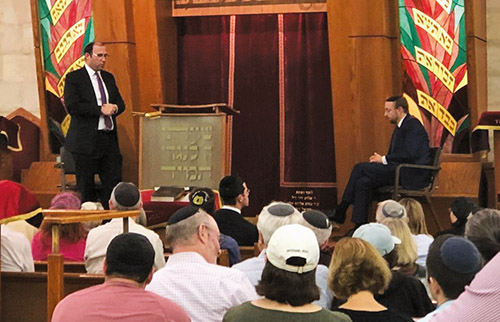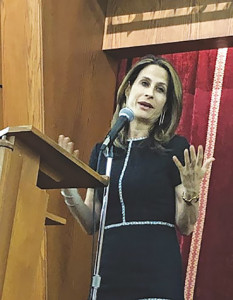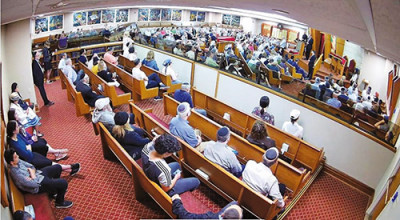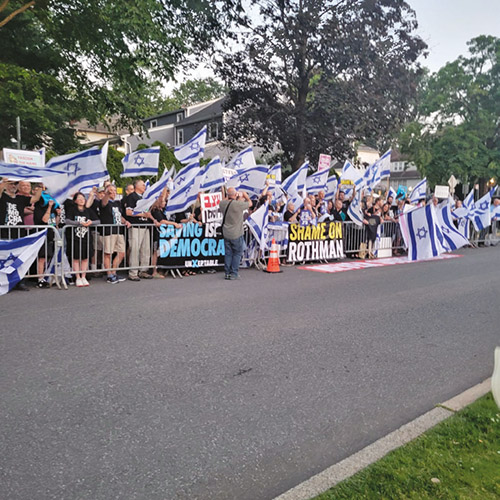
The intense debate and heated protests about the proposed judiciary reforms in Israel have crossed the Atlantic and come to the Teaneck community. On May 31, Rabbi Elliot Schrier of Teaneck’s Congregation Bnai Yeshurun sent a letter to the shul community urging members to participate in two events, scheduled to occur within two days of one another. The judicial reforms, which were seen as strengthening the parliament and governmental leadership in the balance of power between it and the judiciary, were halted in late March after country-wide protests and a general strike.
The first event was a talk on June 1 by Member of Knesset Simcha Rothman, the chair of the Knesset’s Law, Constitution and Justice Committee, which is overseeing the judicial reform legislation. The second was a talk on Motzei Shabbat, June 3, by Member of Knesset Orit Farkash-HaCohen, a minister in the prior government coalition and a participant in the compromise negotiations on judicial reform taking place with the support of Israeli President Isaac Herzog. Both talks took advantage of the Knesset members’ visits to the U.S. for theCelebrate Israel Parade, on Sunday June 4.
“As you are likely aware, the legislative push for judicial reform in Israel is perhaps the most significant and contentious issue to face Israeli society in the last several decades,” wrote Rabbi Schrier to his members.

Rabbi Schrier strongly encouraged his members to attend both presentations, wherever their personal leanings lie. “Listening to a multiplicity of viewpoints is a central feature of any functioning and thriving democracy. And while, in society at large, civil discourse is unfortunately in increasingly short supply, in CBY we embrace it,” he wrote.
“It is not often that two high-profile members of the Knesset, from opposite sides of the table, will be speaking in our shul within roughly 48 hours of one another. And I do not know of any other shul where anything comparable is taking place. We are a kehillah that cares deeply about the State of Israel, its people, and its future, and that passionate Tziyonut (Zionism) is recognized on both sides of the aisle as well as both sides of the Atlantic. Whether you will be able to join us for both events, just one, or none at all, let us all take pride in our community’s deep connection to the Jewish people in the land of Israel. And let us seize the opportunities of the days ahead to gain a deeper, clearer understanding of the issues facing the nation we love so much,” the rabbi added.
Rabbi Doron Perez, chief executive of the Mizrachi World Movement, said of Mizrachi’s role in bringing MK Simcha Rothman to the Teaneck community: “This event highlights one of the most important things we do at World Mizrachi, which is to bring important issues facing the State of Israel in a meaningful, thought-provoking and engaging way to our affiliated communities in chutz la’Aretz.”
For both speakers, Schrier provided some additional context: “MK Simcha Rothman is one of the leading Knesset figures behind the push for reform, and he will draw from his personal experiences in crafting and fighting for the legislation when he addresses our shul. I strongly urge you to take advantage of this opportunity to hear from one of the central figures in this debate, and to gain an up-close understanding of some of its features.”

“Ms. Farkash-Hacohen is a leading participant in the compromise negotiations regarding judicial reform currently being held under the auspices of President Herzog, and her vision will undoubtedly be different from that of MK Rothman.”
“On too many issues in Israel, you cannot debate,” said MK Rothman to the assembled crowd. “You cannot discuss, you cannot disagree. You cannot reach any different solutions over time, because power has been taken from the parliament and the people. Decisions over very many issues were decided by the courts with a verdict. And the verdict stops the discussion.” MK Rothman enumerated four times over the past 10 years, where Israel’s Supreme Court invalidated laws, having to do with illegal immigration issues, refugees, housing and taxes.
Rothman added that without the judicial reform legislation, the people and the parliament don’t have control over their lives and cannot help enact laws to fix or improve their own conditions, and that the Supreme Court has an unbalanced level of control over the laws it allows the parliament to enact.
He also explained that the compromise legislation, and the concerns that each side has with one another are in reality very small, and that the behind-the-scenes negotiations have taken a backseat to the outsized public response. “The differences between me and MK Farkash are so minute as to be boring,” he said.
MK Farkash-Hacohen said that the situation with the reform legislation in Israel has everyone “very worried as a society,” and focused her talk on the nuts and bolts of the compromise legislation, attempting to explain the complexities of how the government enacts laws when it has no constitution to guide it. “In Israel, the government controls the parliament fully because it takes a majority of the parliament to form a government.” In fact, she explained, there is really no or little distinction between the legislative and executive branch as the ministers of the ruling coalition are the heads of the various executive ministries. The only counterbalance to the government is the Supreme Court.
A Jewish Link editor on site photographed the group of protesters across from the shul who appeared to protest MK Rothman’s presentation, waving Israeli flags. One protester was photographed standing behind a sign that read “Shame on Rothman.” Rabbi Schrier shared that at least one protester was also removed from MK Farkash-Hacohen’s presentation, for attempting to disrupt her speech.
The political activism outside Congregation Bnai Yeshurun was not the first judiciary reform (or anti-judiciary reform) protest in the United States in recent weeks to attract public attention. In late May Israeli Minister of Science and Technology Ofir Akunis canceled his appearance at an event in Los Angeles, due to announced plans for a protest. In announcing the minister’s absence, Israeli Consul General in Los Angeles Hillel Newman stated publicly: “In the end, he decided he’s not coming. He said that he felt that his presence here might cause more provocations of the people outside and the protestors, and he said he didn’t want to bring a bad feeling or bad vibes to anything associated with him or the state of Israel.”
MK Rothman faced protests at other planned meetings over the weekend in New York City as well, including possible disruptions to the Celebrate Israel Parade on Sunday, June 4 by judiciary reform protesters, with one prominent Jewish publication running a news story with the headline “Well Financed Anarchists Plan to Ruin Israel Day Parade in NYC.” According to two sources who attended the parade, however, these heightened fears were not realized, though opposition to judiciary reform was quite visible at the parade.

David B., a community member who lives in New York City, shared with The Jewish Link that he participated in a large Ameinu organization contingent that marched in the parade. This contingent was organized by leaders of a group called UnXeptable, which urged all of its marchers to act respectably, to chant specific slogans, and to wear only Ameinu parade T-shirts that carried the words “Zionism Equals Democracy,” and “Marching for Democracy.” The Ameinu contingent included New York Rep. Jerry Nadler, Manhattan Borough President Mark Levine and former Israeli Consul General to New York Assaf Zamir.
UnXeptable is the group that is also attributed to having organized the protests in Los Angeles, the protests against MK Rothman in New York, and the one at Congregation Bnai Yeshurun.
Harry Glazer is the Middlesex community editor of The Jewish Link. He can be reached at harryglazer615@gmail.com and he welcomes feedback.











